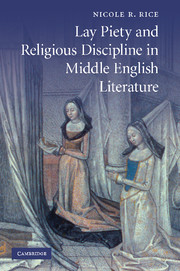Book contents
- Frontmatter
- Contents
- Preface
- Acknowledgments
- Abbreviations
- Introduction
- Chapter 1 Translations of the cloister: regulating spiritual aspiration
- Chapter 2 Dialogic form and clerical understanding
- Chapter 3 Lordship, pastoral care, and the order of charity
- Chapter 4 Clerical widows and the reform of preaching
- Conclusion: Spiritual guides in fifteenth-century books: cultural change and continuity
- Notes
- Bibliography
- Index
- CAMBRIDGE STUDIES IN MEDIEVAL LITERATURE
Chapter 3 - Lordship, pastoral care, and the order of charity
Published online by Cambridge University Press: 30 June 2009
- Frontmatter
- Contents
- Preface
- Acknowledgments
- Abbreviations
- Introduction
- Chapter 1 Translations of the cloister: regulating spiritual aspiration
- Chapter 2 Dialogic form and clerical understanding
- Chapter 3 Lordship, pastoral care, and the order of charity
- Chapter 4 Clerical widows and the reform of preaching
- Conclusion: Spiritual guides in fifteenth-century books: cultural change and continuity
- Notes
- Bibliography
- Index
- CAMBRIDGE STUDIES IN MEDIEVAL LITERATURE
Summary
Walter Hilton and William Langland, rough contemporaries writing hundreds of miles apart, in Nottinghamshire and the West Midlands respectively, viewed the question of lay religious life from rather different vantage points. As S. S. Hussey noted fifty years ago, Hilton was the sober “Augustinian canon and director of souls seeking mystic union with God,” Langland “the wanderer, the talker, dealing primarily with Heaven as reflected in the things of this world.” But Hilton's Mixed Life and Langland's Piers Plowman target readers with similar social backgrounds and responsibilities: speaking of these intended readers, Anne Middleton notes, “[w]hether laymen or ecclesiastics, their customary activities involve them in counsel, policy, education, administration, pastoral care – in those tasks and offices where spiritual and temporal governance meet.” In one case Hilton and Langland also shared an actual readership: the Vernon manuscript (Oxford, Bodleian Library, MS eng. theol. a. 1), probably copied in the late 1380s, contains the Mixed Life (c. 1380–85) together with the A-Text of Piers Plowman (c. 1370). This monumental collection of religious prose and verse, whose index proclaims its purpose to be “Salus Anime” or “Sowlehele,” was compiled for public reading in a religious house, probably a community of nuns. The conjunction of the Mixed Life and Piers Plowman here suggests that at least one early compiler found the two works complementary.
- Type
- Chapter
- Information
- Publisher: Cambridge University PressPrint publication year: 2009



